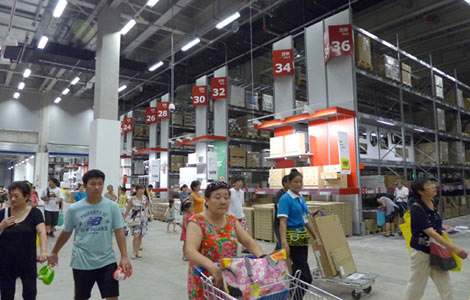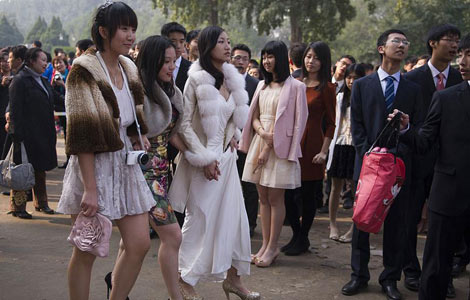Iron ore futures offer hedging tool, greater say in pricing
Updated: 2013-10-19 08:26
By Lyu Chang in Beijing and Zhang Xiaomin in Dalian, Liaoning (China Daily)
|
||||||||
The world's first iron ore futures with physical delivery debuted on Friday on the Dalian Commodity Exchange, a move seen by industry insiders as a way to gain more control of pricing of the world's second-most traded commodity.
The first yuan-denominated iron ore futures contract is also China's latest attempt to chip away at the pricing power of global mining giants such as BHP Billiton Ltd, Vale SA and Rio Tinto Group.
China is the world's top importer of the raw material for steel, and the contract provides a hedging tool for the nation's steel mills and traders, experts said.
"The pricing of iron ore, a major raw material for steel production, depends largely on the Platts index, which is based on the tender prices of some major producers. This method can't fully reflect the supply and demand balance," said Wang Xiaoqi, vice-chairman of the China Iron Ore and Steel Association.
"Domestic steel mills, which are scattered around the country and lack bargaining power in the global market, are exposed to higher risks because of price volatility."
He added that physically backed delivery, as offered by the contract, can do much to reduce the chance of major players controlling the commodity's price.
The contract brings the price closer to spot levels, reducing the cost of steel production and enhancing market transparency.
The iron ore contract adds to existing domestic hedging tools in the form of rebar, coal and coke contracts.
Many Chinese steelmakers and iron ore traders from both the private sector and State organizations have expressed an interest in using the iron ore futures market as a hedging tool. Some mills, such as Nanjing Iron & Steel Group Ltd, have even set up iron ore futures divisions.
"Currently, domestic steel mills mainly hedge the risks of the iron ore trade by adjusting their purchasing and production strategies," said Li Daguang, deputy general manager of Ansteel International Trade Co.
"They buy more when the price is quite low and buy less and suspend production for overhaul of the blast furnaces when the price is high.
"But the iron ore futures platform at the Dalian Commodity Exchange will help steel companies lock in costs and control risks," he said. In addition, the renminbi-based pricing of the contract will help attract more domestic steel mills and traders.
The first day's trading volume exceeded 338,700 lots, including the buy and sell sides. The contract is for 100 metric tons per lot, the exchange said in a statement on its website.
Physically delivery will be accomplished with imported iron ore powder with 62 percent iron, or both refined iron ore powder and iron ore concentrates with an iron content above 60 percent as a substitute, the statement said.
Wang Guoqing, an analyst of iron ore futures, said that China, as the world's top iron importer and consumer, has great spot markets that can better support domestic steel makers.
Mills need to upgrade, especially as the steel sector is experiencing serious excess capacity.
"But the regulators should also use the tools in a cautious way to curb speculation and cool inflation," he added.
China is the second-largest producer, the biggest importer and the largest spot trading market for iron ore.
Last year, the nation produced 440 million metric tons of iron ore and imported 740 million tons.
Contact the writers at lvchang@chinadaily.com.cn and zhangxiaomin@chinadaily.com.cn.
(China Daily 10/19/2013 page10)
Most Viewed
Editor's Picks

|

|

|

|

|

|
Today's Top News
No secret papers for Russia, says Snowden
Stable growth 'paves way for reforms'
Chinese firm buying NY landmark
Workers' right to a rest stressed
China, EU to hold investment talks
Students asked to show poverty for grants
Mandatory student internships under fire
Shanghai to reduce PM2.5 20%
US Weekly

|

|














